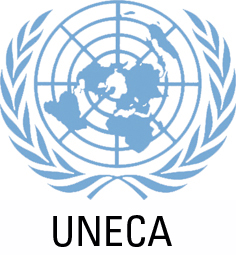Focal point
Location
P.O. Box 3001
Addis Ababa, Ethiopia
Established by the Economic and Social Council (ECOSOC) of the United Nations (UN) in 1958 as one of the UN's five regional commissions, ECA's mandate is to promote the economic and social development of its member States, foster intra-regional integration, and promote international cooperation for Africa's development.
Made up of 54 member States, and playing a dual role as a regional arm of the UN and as a key component of the African institutional landscape, ECA is well positioned to make unique contributions to address the Continent’s development challenges.
ECA’s thematic areas of focus are as follows:
- Macroeconomic Policy
- Regional Integration and Trade
- Social Development
- Natural Resources
- Innovation and Technology
- Gender
- Governance
Members:
Resources
Displaying 346 - 350 of 872Contribution of the Sahara and Sahel observatory to the first meeting of the committee of development information
The countries of circum-Sahara Africa adversely affected by desertification, their sub-regional organisations, their Northern partners and the concerned international organisations of the United Nations System have created the Sahara and Sahel Observatory (OSS) in May 1992. OSS's mission is conducted within the international framework of the Convention to Combat Desertification (CCD) and Agenda 21 and aims to favour the development and the optimisation of its African partners' information wealth, for an optimal use of the means for combating desertification.
Contribution of the Sahara and Sahel observatory to the first meeting of the committee of development information
The countries of circum-Sahara Africa adversely affected by desertification, their sub-regional organisations, their Northern partners and the concerned international organisations of the United Nations System have created the Sahara and Sahel Observatory (OSS) in May 1992. OSS's mission is conducted within the international framework of the Convention to Combat Desertification (CCD) and Agenda 21 and aims to favour the development and the optimisation of its African partners' information wealth, for an optimal use of the means for combating desertification.
Emergency mapping for infornmal settlements as the geoinformation base for planning basic services
The informal settlements, townships, temporary camps and other human posts need at least basic services such as potable water, electricity and sanitation. Other services such as food supply, medical aid and shelters are usually arranged in case of disasters and large human migrations. A proper and efficient services need should be well estimated and simply implemented. All requirements can be achieved as results of evaluation with use of the geo information decision support system GDSS, suggesting services sorts and quantities.
Emergency mapping for infornmal settlements as the geoinformation base for planning basic services
The informal settlements, townships, temporary camps and other human posts need at least basic services such as potable water, electricity and sanitation. Other services such as food supply, medical aid and shelters are usually arranged in case of disasters and large human migrations. A proper and efficient services need should be well estimated and simply implemented. All requirements can be achieved as results of evaluation with use of the geo information decision support system GDSS, suggesting services sorts and quantities.
Executive summary : an integrated geo-information (GIS) with emphasis on cadastre and land information systems (LIS) for decision-makers in Africa
The status of cadastral and land information systems in Africa is assessed, with specific reference to their capacity to assist decision-makers. Recommendations and guidelines are provided for the adaptation of existing systems and/or the development of new systems, so that they can be used for land reform, physical planning and integrated land administration. The guidelines take into account the need to create land information for decision-makers without creating unaffordable costs to the state, given that the average per capita income for Africa in 1995 was USD665.


